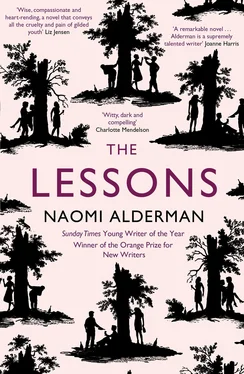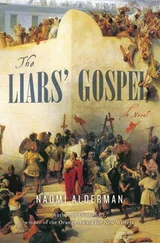At 7.45 there was Simon, at last, after phone calls and messages. He’d been delayed, it was unavoidable, but bloody hell he was sorry and how the fuck were we and what were we drinking and he’d get the round. He bought bottles of expensive wine and talked about markets and explained that next year he’d be working in Chile. Or maybe in Mexico, possibly Greece. He joked, as he spoke about bull and bear markets and emerging sectors for growth, and I looked at Jess and I wondered how I had ever been friends with this man.
By 9 we were hungry. Even Franny and Simon, who’d been jousting with each other all evening. Little digs, little mentions of the past they had shared. She brought up the new girl, what was her name, Xena? Xenia, he said, and how now was Rob? Eventually, starving, I mentioned pizza, and Franny, dismayed, said, ‘But how will Mark find us?’
And Jess said, ‘It’s 9 now. Surely he’s a no-show?’
And this led to grumbling, which we did with gusto, because at least this was a topic we shared. It had only been twelve months but already it was obvious that we no longer had much to say to each other. There was affection, certainly, and memories of kindness, but not much of substance except about Mark.
At 9.30, a message, much delayed and much regretted, but Mark would not come. Stuck in Dorblish, he said, with Si’s family. And we sighed and said how like Mark, how typical. Except perhaps I saw a flicker of annoyance cross Simon’s face, but he ordered another bottle and more crisps and more nuts.
The conversation lulled and grew stiff. There were awkward pauses. Franny smoked cigarette after cigarette and Emmanuella stole from her pack, and when she said, ‘These are not as good as Mark’s cigarettes,’ Franny said, ‘Then why don’t you …’ and then paused and said, ‘Bloody Mark. Getting us all here and not showing up.’ And we agreed and muttered that it was all Mark’s fault.
We drifted away from the bar just after 10. The last few minutes had been better, brighter, after I’d said I needed an early night — school teaching, you know — and I knew that the others had been thankful to get away too. We promised to stay in touch, to see each other more often, but without Mark I could not imagine how it would work. He had been the centre, the one who bound us together, because beside him we seemed more similar to each other. Without him, Emmanuella was too rich, and Franny too opinionated, and Simon too shallow. Without him, we were just a scattering of people.
Jess and I went home together, and I felt so relieved and so full of gratitude that of all these people she was the one I could go home with. I held her hand as we walked to the station, and I thought, if I had to choose again, right now, from the beginning, I would still choose her.
I suppose that some men might have broken with Jess after what happened with Mark. Those men might have joyfully explored the possibilities now laid before them without shame or hesitation. But I had never been such a man — so open to myself, so tolerant of my own person, so optimistic that life was bound to bring me joy. There are other men, more like me I think, who would have confessed all to Jess, put themselves in her hands, begged for forgiveness and understanding. I have more difficulty in explaining why I did not do this. I think the meagre truth is that I was too frightened to tell her. I couldn’t imagine how she’d react. And, more than that, I was frightened by the idea of who I might be without her. She was the very centre and focus of my life, she was my rudder. I feared leaving her as I might have feared travelling without possessions or money to a distant land where I knew neither any living soul nor a single word of the native language, with no passage home.
This is not wise. To hang one’s life so completely on another person is not sensible. But it’s a line written in my character, like a vein of metal scribbled through a stone. I cannot love in any other way than this, so it is for me to choose whom I love with care. Or can one choose at all? But Jess is a good person; she never hurt me intentionally, and this is quite a thing to say about another human being.
In any case, I had not spent my time miserably. Jess and I both had new jobs. Teaching kept me busy most of the time. Jess’s work with the orchestra kept her out late, and occasionally travelling, so that we were constantly experiencing joyful reunion. We had our little flat to decorate and domestic life to arrange. And we had each other finally, alone at last. Any fear in me that my desire for Jess might have evaporated was utterly dissipated within a day of moving into our new flat. We made love in our own home, under our own sheets, with our belongings still half in bags and boxes around the bedroom and in the hall. My desire for her was still as strong as ever, my pleasure in her body as intense. And so it continued from then on.
Only sometimes I would think about that night in the kitchen with Mark and a kind of longing would overcome me so that I thought I might fall to my knees. It was a longing filled with self-loathing, with desperation and embarrassment and fear. Like a whiff of solvents, it stunned for a moment and then evaporated. Or sometimes I would hide in the toilet and just think around those events, breathing, feeling them, until the thoughts overwhelmed me. I didn’t know what to do with these feelings, so I cut them off from the rest of my life. It’s an easy trick to master.
So perhaps it was down to me as much as any of us that ‘the gang’ didn’t get together. I didn’t want to see Mark, didn’t want to be reminded.
It was Jess who arranged such reunions as there were. Franny was our most frequent visitor; she often came down from Cambridge to sleep on our sofa, eat mushroom pie in front of the telly, drink red wine and tell tall tales of Cambridge dons. Emmanuella we saw nothing of. She sent us a videotape of the arts and culture programme she presented, but, as it was in Spanish, we could do no more than verify her identity.
Simon was always sending apologies. We didn’t want to see him and Franny together, not any more, so Jess suggested dinners in town, evenings out, a play or two — although plays and dinners and evenings out were always contaminated by the memory of Mark’s money. With new friends, we didn’t feel ashamed to suggest supermarket pizza and a video. With Simon or with Franny or with Emmanuella, we all wondered why it could not be a Maison Blanc supper or the stalls at an opening night.
Simon, in any case, rarely turned up. Dinners would be cancelled because he had to fly to Aarhus, weekend pub lunches postponed because he was needed in Berlin. There was one stilted and awkward evening of drinks with Simon and his latest girlfriend, Frieda. She had hair like Franny, corkscrew curls with a centre parting, and had similarly angular, dark-framed glasses. She wasn’t Franny, though. She didn’t understand our jokes, declared herself completely uninterested in politics, and was faintly amused by Simon’s protestations that ‘everything’s politics’. Their relationship didn’t last long. The next time we heard from him, he cheerfully told us she’d buggered off back to Switzerland and he wouldn’t mind except he knew he’d never get his skis back.
As for Mark, for a long time there was silence. After Oxford, after graduation, nothing. We learned, via an obituary in the paper, that he had lost his father and thus come into more money than he could hope to spend in a dozen lifetimes. We tried to contact him, to express our sorrow, but our phone calls and letters went unanswered. Eventually, though, there were postcards. First, after the failed pub trip, a picture of a bull, horns down, from Seville. He was sorry, so sorry he’d let us down. He’d shut up Annulet House, was travelling, but he’d see us soon, he promised, soon. I hoped he was wrong and said nothing. A few months later, Franny reported a postcard from Argentina, telling how he had made special friends with a gaucho. Later, Emmanuella said she’d had a letter from him postmarked Stockholm, but describing some adventure at the races in Hong Kong. A few months after that, Jess and I had another postcard. It was from Venice, a picture of a line of the key-like structures on the prows of gondolas. On the back was written:
Читать дальше












